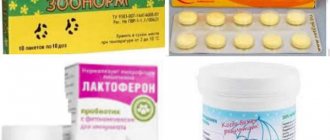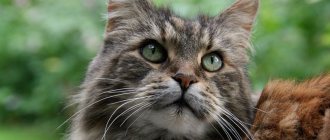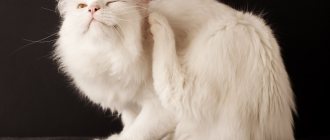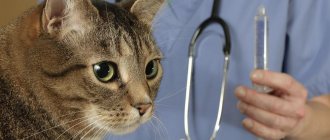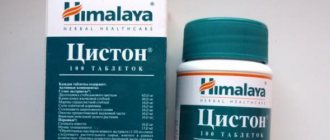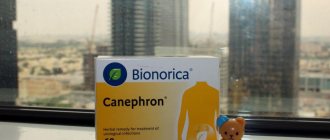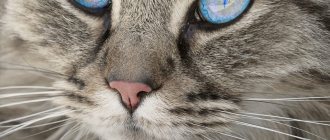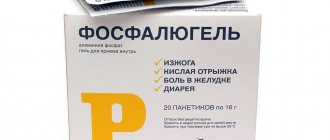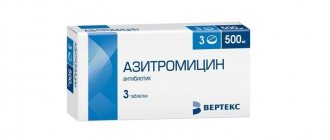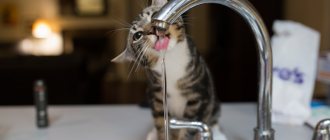Chemical composition and characteristics
Problems with the gastrointestinal tract are usually treated with diet and taking sorbents that remove toxic substances from the body. One of these products is Polysorb. In veterinary medicine, a concentrated drug containing 98% of the active substance is most often used.
Polysorb is effective for cats with digestive disorders, as well as during the rehabilitation period after surgery. Such a product is additionally marked with the letters “VP”. In medicine, powder labeled “MP” is used. The drug contains colloidal silicon dioxide in quantities: 12 g, 25 g, 50 g, 100 g - depending on the manufacturer and packaging.
Did you know? In 1963, for the first time, a cat named Felicette from France was sent into space.
Polisorb's analogues
There are no direct veterinary analogs of Polysorb. A replacement is any sorbent. At the discretion of the doctor, another drug with detoxicating properties is prescribed.
This article was prompted by a recent incident. My Chupacabra really loves grass, a special green grass that is sold in pet stores. And then one day I bought him the wrong grass.
Although, it would seem, how can a pet store sell some kind of different herb!
In the evening, Chupacabra was gnawing grass with pleasure, and at night strange sounds were heard. And in the morning I discovered several strange puddles on the floor - Chupacabra was vomiting at night.
But since we are all accustomed to the fact that cats spit up their fur from time to time, especially if they are fluffy, I did not pay attention to this. And she went to work. And in the evening I found several more caustic puddles on the floor and a completely exhausted Chupacabra lying on the bed like a rag. The cat was clearly poisoned. But what could he have poisoned himself with?
Naturally, the newly acquired weed went into the trash, and the Chupacabra still had to be treated for several days. No one could have expected such a situation from simple cat grass.
I decided to ask in more detail about the causes of such poisonings from a specialist, veterinarian Marina Mikheenko , zoo
“A cat is the whole world” is an absolutely true statement. Not only figuratively, but also literally: in the gastrointestinal tract of every cat lives a whole ecosystem of beneficial and pathogenic microorganisms, the “force of good” and the “force of evil.” If a cat is healthy, its “good” always defeats “evil”. And the tray is in complete order. This ecosystem of bacteria, protozoa, viruses and microscopic fungi is called a biome, or microbiome. Hill's Pet Nutrition has spent a decade studying the microbiome of cats.
The result of these studies was a new dietary food for cats, Hill's PRESCRIPTION DIET Gastrointestinal Biome with chicken. The diet contains advanced ActiveBiome+ ingredient technology. This unique blend of prebiotic dietary fiber helps maintain microbiome balance, naturally restoring normal, regular bowel movements in your cat . The diet is rich in Omega-3 and Omega-6 polyunsaturated fatty acids and contains clinically proven antioxidants* that help support a healthy immune system.
Hill's new helps promote healthy digestion in cats, which helps improve overall body health.
When choosing a special food, be sure to consult a veterinarian
Properties of the drug
The drug binds and removes toxins, food and bacterial allergens, microbes, toxic products that are formed as a result of protein breakdown in the intestines. The absorption of the drug in the gastrointestinal tract practically does not occur - it comes out unchanged. "Polysorb" is not a toxic drug for people and animals; it is classified in the fifth hazard class.
Release form
The product is available in the form of a loose white powder, tasteless and odorless. It is necessary to prepare a suspension for oral administration from it. The powder is packaged in individual bags made of label paper with an internal thermal layer, which are placed in cardboard packaging. Also, the medicine is available in polystyrene or PET jars.
Important! The use of the drug is possible only after consultation with a veterinarian. After establishing an accurate diagnosis, the doctor will prescribe the dosage and frequency of administration.
Indications and possible limitations
The drug is used to treat acute intestinal diseases, including salmonellosis, foodborne toxic infections, which are accompanied by vomiting and diarrhea, and intoxications. It is used externally to treat skin ailments, purulent wounds, and ulcers.
For domestic cats, both a veterinary drug and Polysorb MP, which has a similar composition, can be used. It is used for complex therapy of helminthic infestation, as well as for the prevention of intestinal infections or poisoning, for example, in the case of eating poor-quality food, in preparation for vaccination.
When vomiting
When cats vomit, prepare a suspension of 1/2 teaspoon of powder diluted in 30 ml of water, which is given to the animal 5 times a day at intervals of 1 hour. To prevent dehydration of the body, therapy is supplemented with the drug "Regidron" - according to the instructions, 2-3 hours after the sorbent.
Did you know? The movement of a cat's ear is controlled by 32 muscles. Therefore, these animals are able to rotate their ears 180°.
For diarrhea
The sorbent treatment regimen for diarrhea will be the same as for vomiting. It is important to prevent dehydration and, in addition to Polysorb, force the animal to drink water using a syringe.
It is best to dilute Polysorb for cats with boiled water, approximately 20-30 ml. You can administer the drug using a syringe without a needle, slowly injecting it behind the cheek of a furry patient.
In case of poisoning
In case of poisoning, Polysorb is given 2-3 times a day. During the first 24 hours of therapy, the animal is not fed, only watered. From the second day they try, in small doses, to give diet food.
For chronic renal failure
For chronic renal failure, a 5-7-day course of body cleansing with Polysorb is prescribed. Usually the following regimen is prescribed: 1/3 tsp. dilute in 10 ml of water, drink the drug 30 minutes before meals (twice a day).
You will be interested to know why the cat lost his appetite.
What to replace it with?
Analogs of this drug are:
- Enterosgel;
- Smecta;
- Lactofiltrum;
- Polyphepan;
- Ecoflor;
- Activated carbon.
You cannot prescribe them to your dog on your own instead of Polysorb, since each of these drugs has its own spectrum of action, indications and contraindications, compatibility with other medications and side effects.
Instructions for use
A suspension for oral use is prepared as follows:
- Add 1 tsp to a glass with 20 ml of still or chilled boiled water. (1 g) or 1 tbsp. l. (3 g) powder.
- Thoroughly mix the prepared suspension.
The cat must be given water from a syringe 2-3 times a day. For acute intestinal disorders, the course of treatment is from 3 to 5 days. On the recommendation of a veterinarian, the course can be extended to 10–15 days. Dry powder should not be given to a cat. It is also prohibited to mix it into food. The daily dose is calculated based on body weight.
Only a veterinarian can adjust dosage. After the symptoms are eliminated, you can continue to give your pet cat food. For 1 kg of live weight you need 0.05–0.25 g of Polysorb VP powder and 1 g of Polysorb MP. For cats weighing more than 3 kg, the daily dose should not exceed 1 tbsp. l. or 3 g. The medicine is given 1–2 hours before or after feeding. Before each use, the suspension must be mixed well, achieving a uniform distribution of the active substance.
Video: how to give Polysorb to a cat
Negative effects
The drug is usually well tolerated by animals and rarely has negative effects on cats. Side effects include allergic reactions, constipation, and disturbances in the digestive system. The product should not be used to treat pregnant and lactating cats, since testing has not been carried out on this group of animals. Also, you should not give the suspension to pets who have an individual intolerance to the active substance.
Despite the fact that, according to some people, cats have nine lives, they may not recover from severe poisoning. Since small kittens have not yet strengthened their immune systems, and diarrhea and vomiting can quickly lead to dehydration and death, you should not treat them yourself to prevent disastrous consequences. At the first manifestations of illness, it is better to immediately contact a veterinarian, who will be able to determine the exact cause of the disease and promptly prescribe competent treatment.
We recommend that you familiarize yourself with the features of keeping, feeding and caring for a cat.
Is it possible to give?
For poisoning and diarrhea
Despite the fact that the drug is intended for people, it is often prescribed by veterinarians to treat dogs with such phenomena as diarrhea and intoxication of the body. Polysorb binds molecules of a certain type, characteristic of toxins, and does not affect those that are necessary for the body. This quality is especially important in the treatment of liver diseases in dogs and the consequences of helminthic infestation.
Polysorb eliminates from the intestines:
- poisons;
- toxins;
- bilirubin;
- urea;
- allergens;
- metal salts
- and other pathogenic substances and compounds that have a destructive effect on the gastrointestinal mucosa and the body as a whole.
The drug acts only within the stomach and intestines and partially reduces irritation of the mucous membranes due to the rapid neutralization of toxins. The action of this sorbent is also aimed at cleansing the dog’s blood.
The drug is diluted with water to form a suspension and given to the dog using a syringe without a needle. The sorbent immediately interacts with the environment of the stomach and intestines. All other medications must be given to the animal only two hours after using Polysorb, otherwise it will slow down and even neutralize their effect.
If the stool contains an admixture of blood, the use of the sorbent is strictly prohibited. Also, if there are any signs of poisoning, you should not give your dog vegetable oils and dairy products until you find out what exactly poisoned the animal.
Taking Polysorb if your dog is poisoned does not cancel a visit to the veterinarian.
For allergies
To cure a dog of an allergy, it is necessary to identify the allergen and eliminate it. Very often, this turns out to be chicken meat, especially breast and leg pulp (surprisingly, chicken giblets and offal are most often digested and absorbed by dogs without problems). Chicken can be successfully replaced with turkey or beef. It is not recommended to feed pork and lamb to dogs.
In addition to the diet prescribed by the veterinarian, Polysorb is used to remove toxins daily three times a day on an empty stomach in a dosage based on the weight of the animal (consultation with a veterinarian is required to determine the dosage). The duration of the course of taking the sorbent is also determined by a specialist.
The therapy will also be useful for urticaria and an increase in the number of eosinophils in the blood.
When vomiting
Polysorb for vomiting in dogs is prescribed after gastric lavage at a dosage of 0.2 grams per kilogram of body weight, this is calculated per day, and the entire dose is taken in 4 doses. For indomitable vomiting, the drug can be prescribed at the rate of 0.3 grams per kilogram of body weight and also divided into 4 doses.
Drug interactions
"Polysorb" can be used both as an independent medicine and in combination with other drugs in complex treatment, including antibiotics. When treating diseases accompanied by vomiting and diarrhea, it is necessary to provide the animal with plenty of fluids and drugs that retain fluid in the body, glucose solution. The minimum time interval between taking sorbents and other medications should be 30 minutes.
Why vaccinate your domestic cat?
It is a mistake to believe that cats living in an apartment are reliably protected from infections and helminthic infestations. In order to get sick, an animal only needs contact with the owner’s shoes and clothes, not enough high-quality food or banal stroking with an unwashed hand. Because pets lick themselves, one parasite larva is enough to cause an infestation, and some infectious diseases, including rabies, are transmitted through tiny droplets of saliva and blood. And they may well end up on the owner’s shoes or street clothes. That is why vaccinations are equally necessary for both a pet that roams freely and an exclusively domestic cat.
Routine vaccinations are usually carried out in spring and autumn, when the likelihood of infection is higher. Before vaccination, the animal will be examined by a veterinarian, and 2 weeks before the injection, deworming will have to be done - the cat will be given an anthelmintic drug that will remove parasites and help reduce the risk of complications. The only problem is that the anthelmintic drops and tablets themselves are quite toxic, so 12 hours after taking them, you can give your cat a sorbent to preserve liver health.
Storage conditions and shelf life
As indicated in the instructions, the drug can be used for 3 years after its release. The prepared suspension is suitable for use within two days under storage conditions: temperature - from +8°C to +15°C and humidity - no higher than 80%.
Important! Before giving the medicine to your cat, you need to make sure that the medicine has not expired. Using expired medication is strictly prohibited.
The powdered dosage form should be stored at a temperature no higher than +25° and no lower than 0°C, in the absence of humidity and exposure to sunlight. In a place inaccessible to children and pets, away from food and drinks.
Types of discharge in cats
How can a cat be poisoned? - plants indoors and outdoors
- medications (eg, acetaminophen, NSAIDs, antidepressants, methylphenidate). Eat both your tablets, left in an accessible place, and if you yourself give the animal any drugs prohibited for animals or an overdose of incorrect application, for example, when treating parasite drops. Many people use drugs for dogs and cats, causing poisoning in them. Remember, the medications you use should only be for cats or those prescribed by your veterinarian. And do not forget about dosages, strictly according to the weight of the animal or according to the doctor’s prescription.
— food poisoning (unsuitable food for cats, poor quality or spoiled). Strictly contraindicated - chocolate, caffeine, onions, garlic, fatty meats, purchased minced meat, citrus fruits, grape raisins, apricots, all types of mushrooms, persimmons, nuts, all products with spices, sausages, smoked meats, sweets, canned food for people and much more. The diet must be balanced especially carefully if your cat is on a natural diet, because poisoning may not be acute, one-time, but will manifest itself over time as chronic pathologies. Try not to buy food in bulk; it can often be spoiled; manufacturers recommend keeping the packaging sealed.
